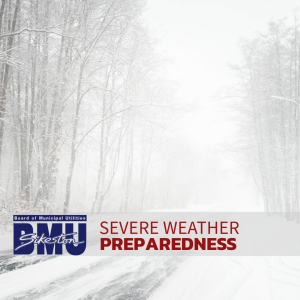Weather forecasts can change quickly. Our BMU team members monitor the weather and prepare to respond if needed. Stay tuned to your local weather news source and take steps to prepare. Monitor our current grid conditions and follow us on social media for updates as well.
Prepare
- If a family member is medically dependent upon electricity or is elderly, make sure to have arrangements in place to maintain their safety if the power goes out.
- Always have essential medications, battery-powered radio, flashlight and extra batteries, canned food and a can opener, and bottled water (at least one gallon per person per day).
- Make sure cell phones and necessary electronics are fully charged.
- Gather blankets, warm clothing, flashlights, or candles.
- Bring family pets indoors or provide shelter during extreme weather.
Save energy
Extreme cold can lead to increased energy usage. Below are some tips to help you manage your energy use and lower your energy bill:
- During the winter, set the thermostat to 68°F when home (or as low as comfortable), and then back to 55-68°F when unoccupied.
- During the winter, open window coverings to let the sunshine in to take advantage of the free heat from the sun. Close the coverings on cloudy days or after the sun sets.
- Set your water heater to 120°F.
- Caulk drafty windows and caulk and weather-strip doors.
- Check your furnace filter and replace it if it’s dirty. A dirty filter makes your system work harder to heat your home.
Protect pipes
Pipes most likely to freeze are:
- Pipes that are exposed to severe cold, like outdoor hoses, swimming pool supply lines, sprinkler lines, and outdoor faucets
- Pipes in unheated areas such as basements, attics, garages, cabinets, or crawl spaces
- Pipes that run near or within exterior walls that have little or no insulation
As temperatures fall, prevent frozen pipes:
- Know where your main water valve is located and how to shut it off.
- Disconnect all garden hoses and drain any water remaining in outdoor faucets.
- Check unheated areas where water lines are located and ensure they are insulated. Heat tape can be used on pipes in these areas for quick and affordable insulation.
- Keep your home temperature set no lower than 55°F. Open cabinet doors to let warmer room temperatures flow in.
- When temperatures are below freezing, let cold water drip from faucets served by exposed or poorly insulated pipes. Even running water through pipes at a trickle can help prevent them from freezing.
- If a pipe freezes, shut off the water immediately, but keep the faucet open. You can thaw pipes by applying warm air with a hair dryer or space heater until full pressure is restored.
- Check all other faucets; if one pipe freezes, others may as well. Slowly turn the water back on and check pipes and joints for any cracks.
Prepare for a power outage:
- Gather in a central room where there is an alternative heat source such as a fireplace.
- Make sure each family member has a warm coat, gloves, and a hat.
- If the indoor temperature drops to 55°F or below, open faucets slightly so they constantly drip to prevent water pipes from freezing.
- If candles and portable heaters are used, never leave them unattended.
- Never use a gas range for room heating.
- Never use charcoal as an indoor heating or cooking source.
- Never use gasoline or other flammable liquids to start or quicken a fire. Always keep a screen around an open flame, and don’t close the damper while ashes are still hot.
- Remember, a fuel-burning heater, such as a kerosene heater, requires proper ventilation to prevent buildup of harmful fumes.
- Place heaters on a hard, non-combustible surface.
- Follow these generator safety tips.

